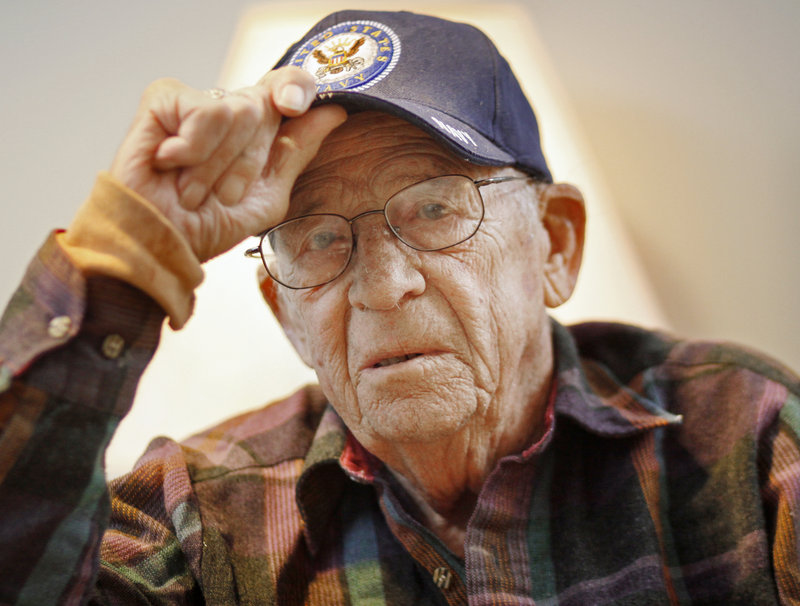SCARBOROUGH — Roxanne Hayford of Scarborough leaned in close to her father, who sat with his legs crossed in a wheelchair at the Maine Veterans Home.
“Dad, what was the name of your ship?” she asked Monday afternoon.
Arthur Edward Atkinson – who goes by “Eddie” – nodded and breathed in, considering the question. He wore khakis, a flannel shirt and a blue Navy baseball cap. A Masonic ring glinted from one finger as he lifted his 88-year-old hands – still capable of a firm handshake – to his chin.
After a pause, he said, “We had explosions on the ship.”
He searched for something more, words to describe to his daughter what it was like to be an electrician’s mate, second class, in the Navy at a time when Japanese planes had bombarded U.S. aircraft and ships at Pearl Harbor in the surprise attack that launched America’s entry into World War II.
After an hour of stops and starts, of recalling bits and pieces of an experience that he rarely spoke of while he and, Dorothy, his wife of 68 years, were raising Roxanne and her two siblings on Elmwood Avenue in Scarborough, Atkinson returned to form.
“I think,” he said, “that’s about all I want to say.”
“Dad’s a very quiet and private person,” said Hayford, who later learned that her father’s three-year Navy tour started in October 1942, nearly a year after the Pearl Harbor attack.
This morning in Scarborough, Atkinson will take part in a small ceremony for Pearl Harbor Remembrance Day. It won’t be as elaborate as those on Memorial Day or Veterans Day, but it will be dignified and it will be noticed.
Today is the 69th anniversary of the attack that killed 2,400 Americans and wounded another 1,200. Around Maine, flags will fly at half-staff.
The two-hour aerial raid destroyed or heavily damaged 21 ships and 320 aircraft. It set in motion events that led to the atomic bombings of Hiroshima and Nagasaki.
While a younger generation remembers Sept. 11, 2001, as the day the United States came under attack from the sky, parents and grandparents and great-grandparents have Dec. 7, 1941, etched in their collective memory.
Joel Eastman, a retired history professor at the University of Southern Maine, said the lesson from Pearl Harbor is to remain vigilant.
“We were not prepared,” he said Monday. “After World War I and then the Great Depression, there were great cutbacks in the military. All the branches were tiny and the equipment was antiquated. We felt the big oceans, the Atlantic and the Pacific, would protect us.”
Only one warship from the fleet in Pearl Harbor remains afloat. The Roger B. Taney, a 327-foot Coast Guard cutter, is now a living museum in Baltimore Harbor.
Aboard the Taney that fateful morning nearly seven decades ago was a gun captain named Francis C. Soares. He had joined the Coast Guard two years earlier as a 17-year-old, happy to accept a Depression-era job that paid $21 a month.
“I remember that day,” said Soares, who settled in Southwest Harbor on Mount Desert Island after spending 30 years in the Coast Guard and serving in World War II, Korea and Vietnam. “We were the only warship in Honolulu Harbor.”
Soares, reached by phone at home Monday, said the first wave of Japanese planes targeted battleships in Pearl Harbor, and the second wave went after airfields. When a plane approached the smokestack of a power plant near the Taney, the U.S. crewmen fired anti-aircraft guns and sent up tracers and saved the plant.
The Japanese pilot “wasn’t going to take his chances trying to fly through all that flak,” Soares said.
In the aftermath, Soares led a machine gun squad to protect district headquarters in Honolulu “until somebody could come back and burn the code books.”
He remembers that pitch-black, moonless night in the city, the sound of police shooting out the lights of stores that had been locked up for the weekend, and shipping out at 2 in the morning to search for submarines.
In Maine, there aren’t many veterans who can tell stories of 1941. The number of state-issued Pearl Harbor Survivor license plates has dwindled from a high of 65 in 2001 to 27 five years ago to, as of last week, a dozen.
“There are just not many of them left,” Vicky Waller, a nurse manager at the Maine Veterans Home, said of World War II veterans.
“A great group of gentlemen. I don’t think they were as well-prepared as our guys are today, but they were ready to serve the country and do what had to be done.”
Staff Writer Glenn Jordan can be contacted at 791-6425 or at: gjordan@pressherald.com
Send questions/comments to the editors.



